Answered step by step
Verified Expert Solution
Question
1 Approved Answer
Are Any Kind Checks, an HDC? Name the elements of an HDC and analyze them in relation to Any Kind as an HDC in each
- Are Any Kind Checks, an HDC? Name the elements of an HDC and analyze them in relation to Any Kind as an HDC in each of the transactions? Explain each in paragraph form.
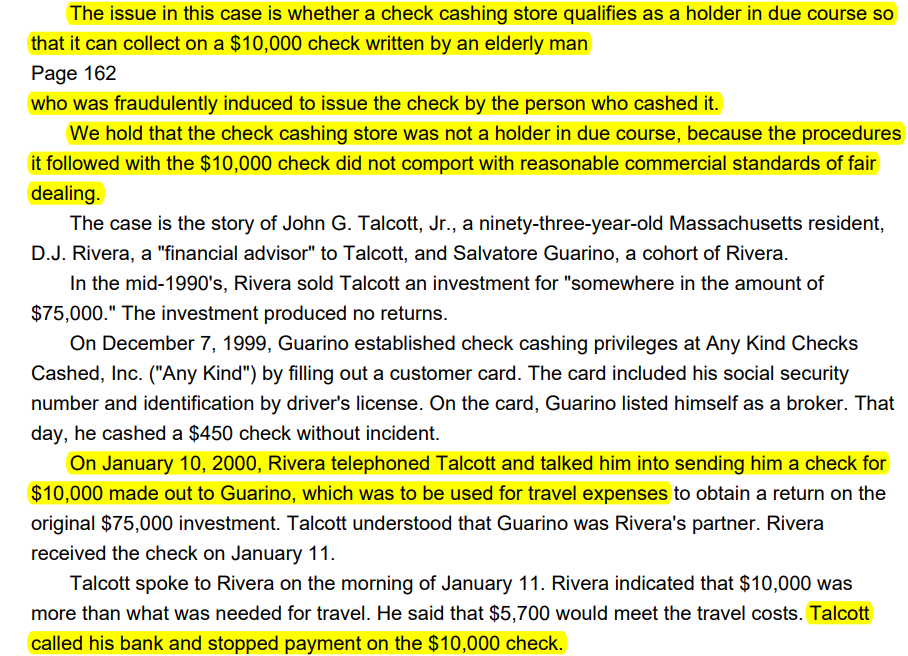
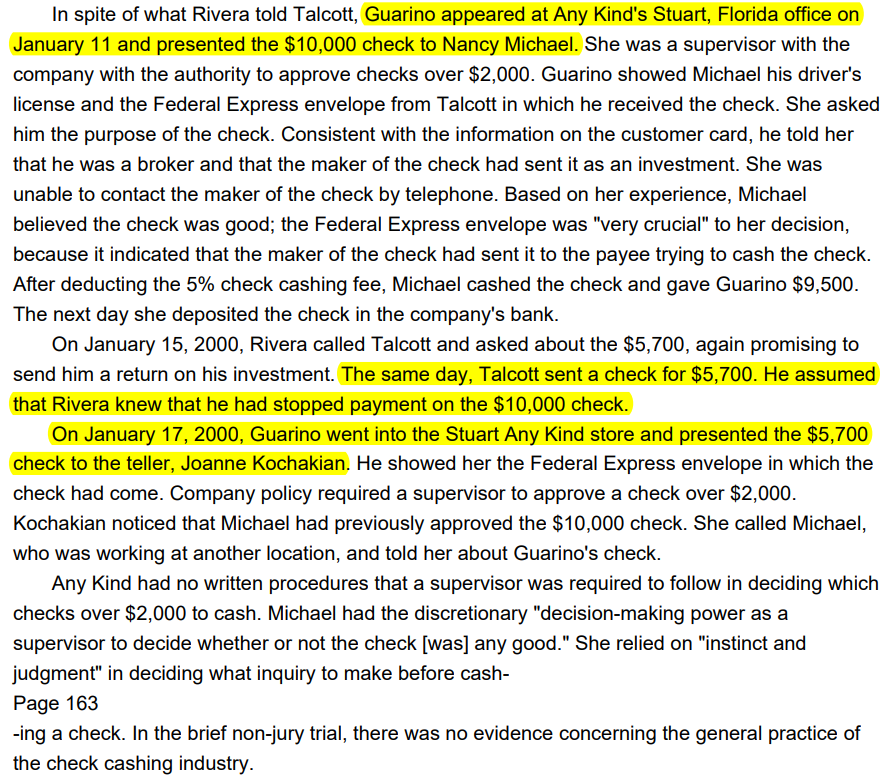
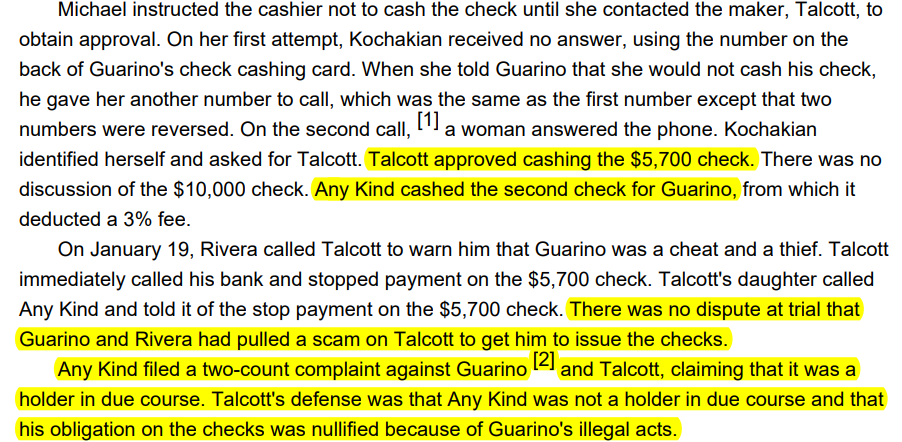
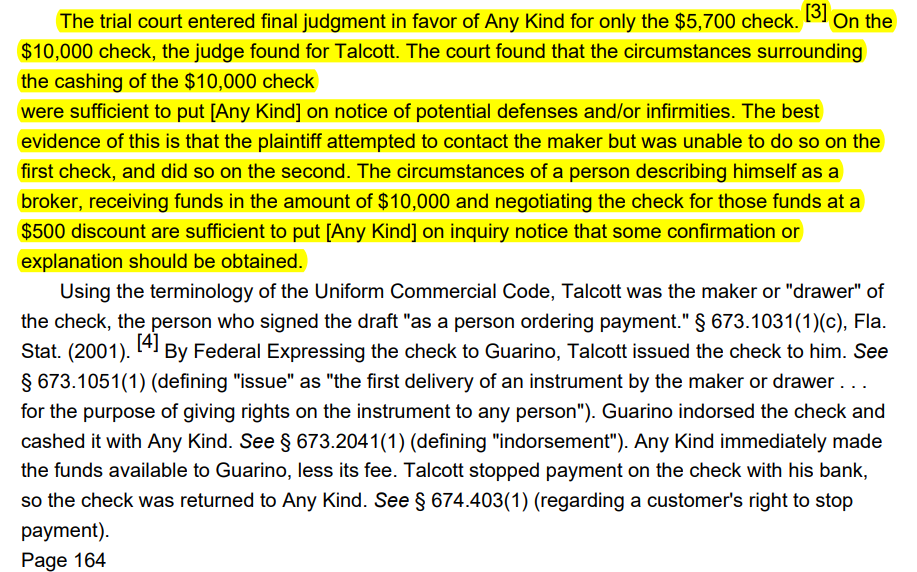
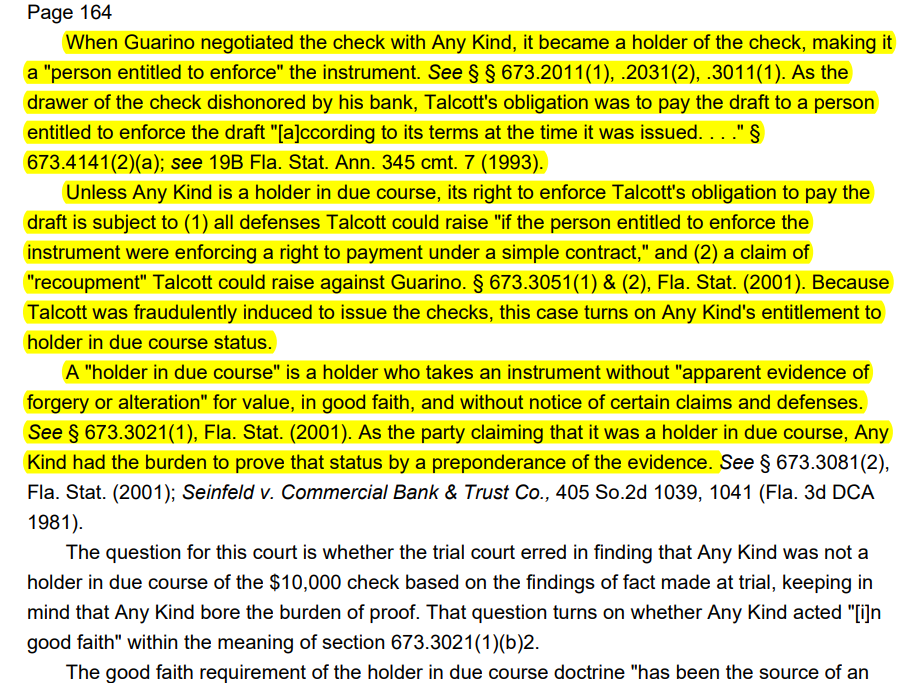
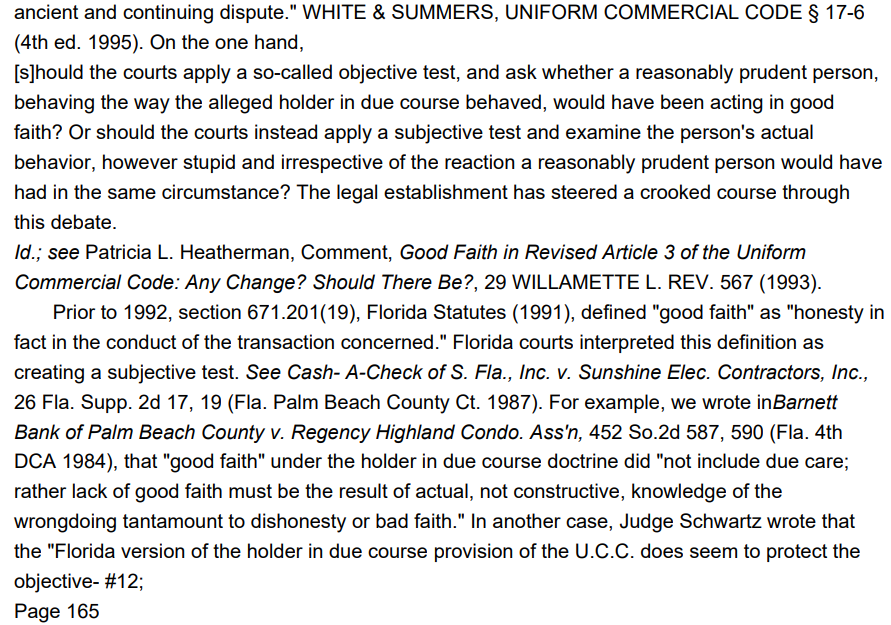
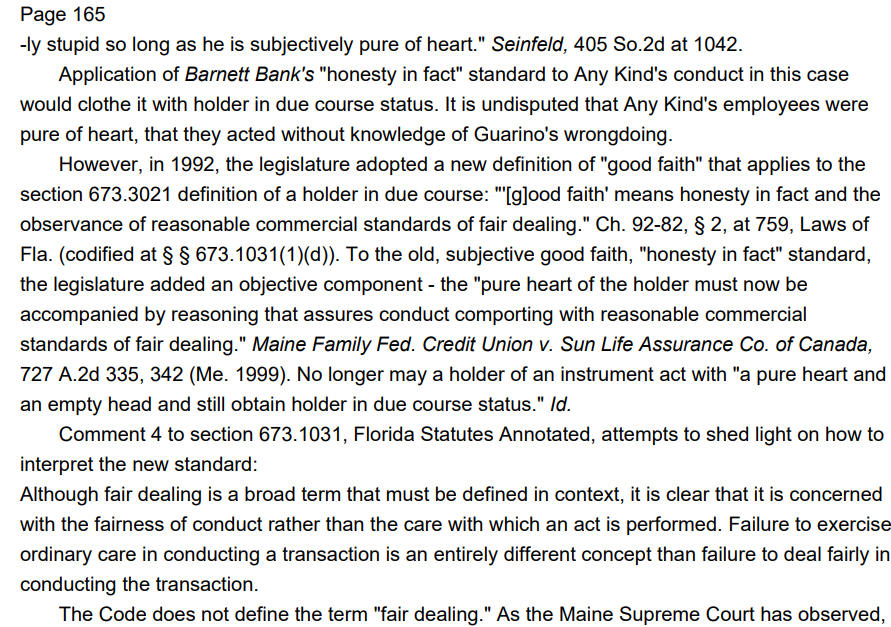
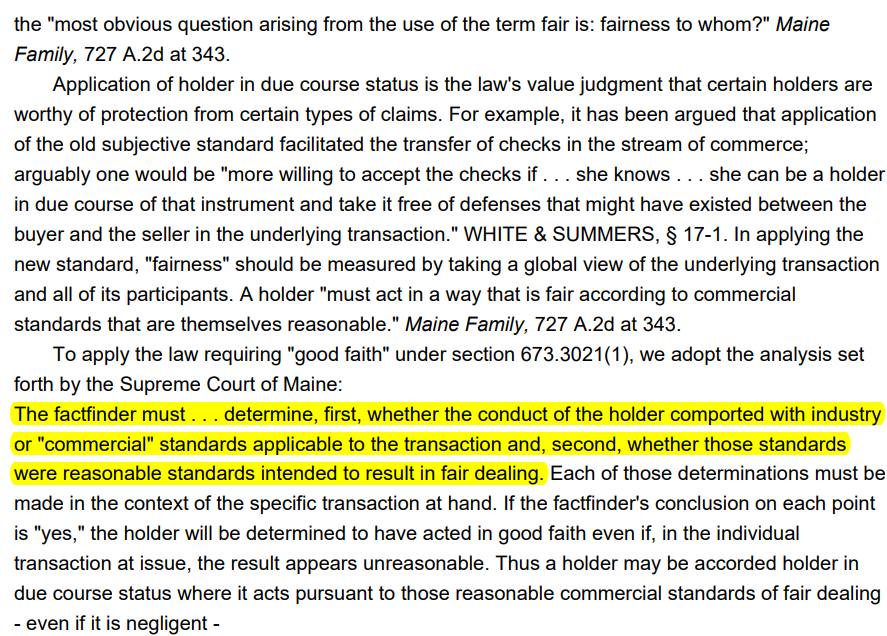
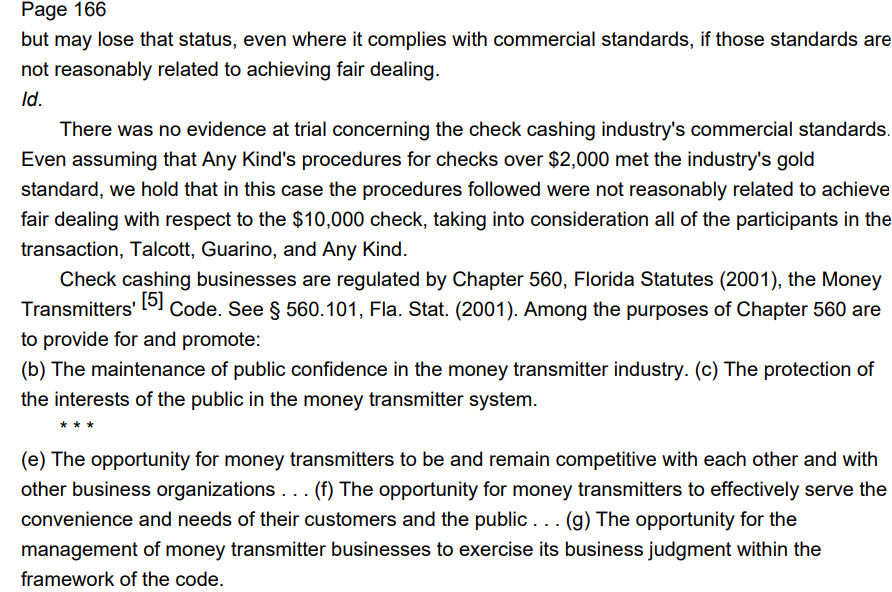
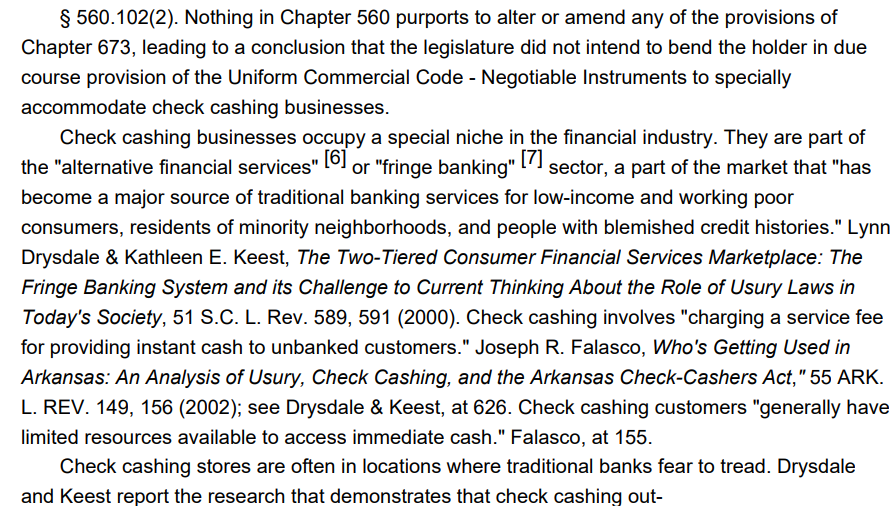
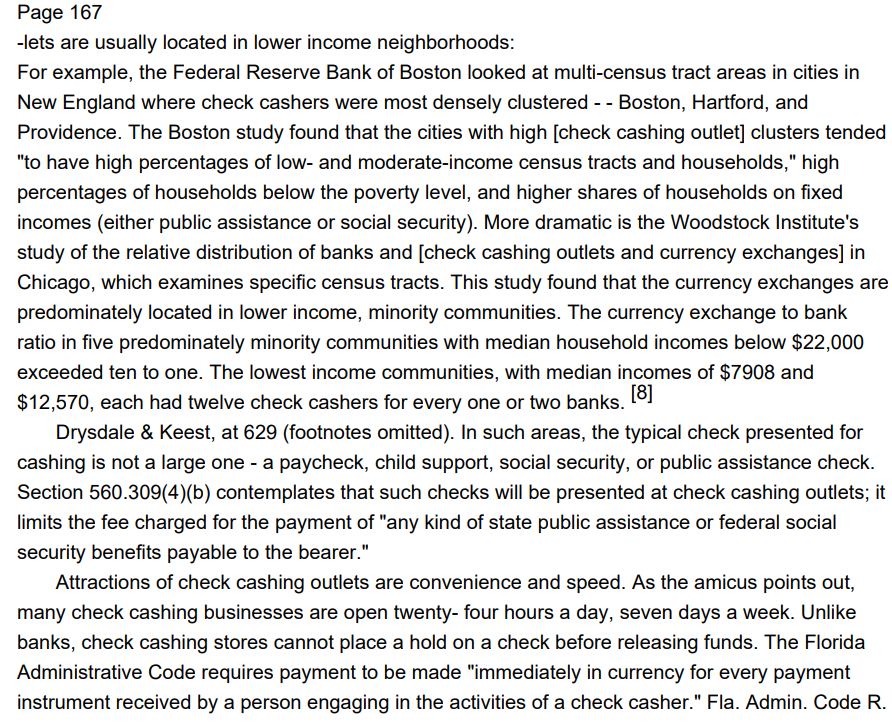
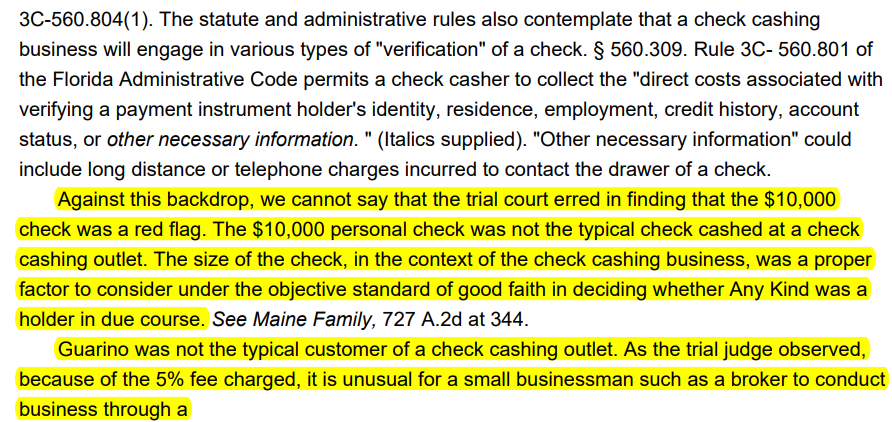
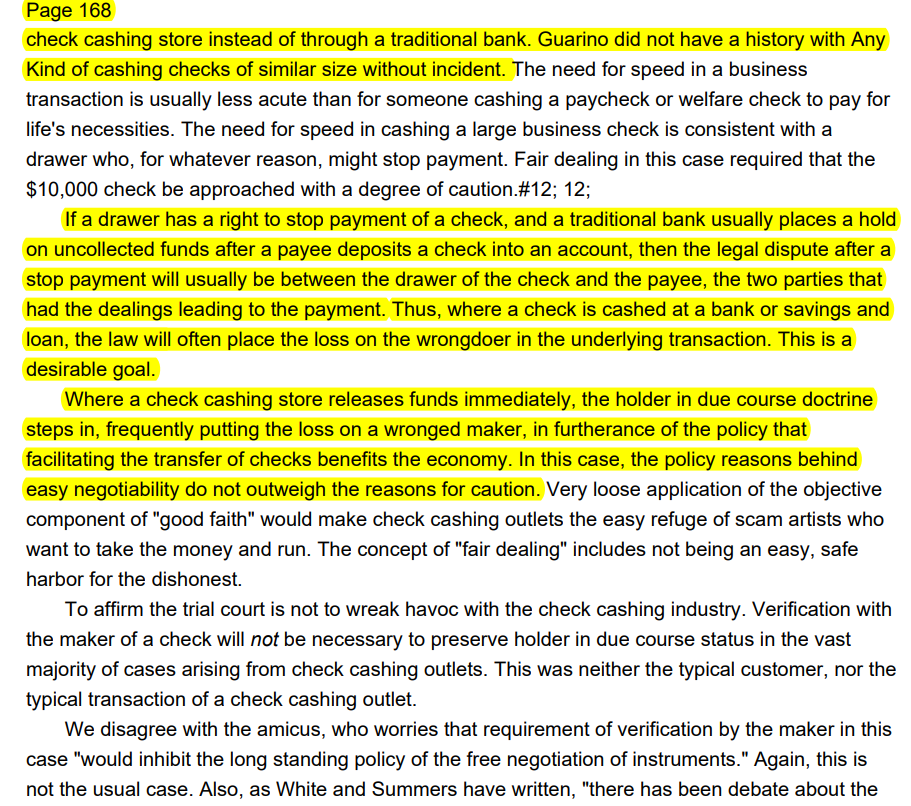
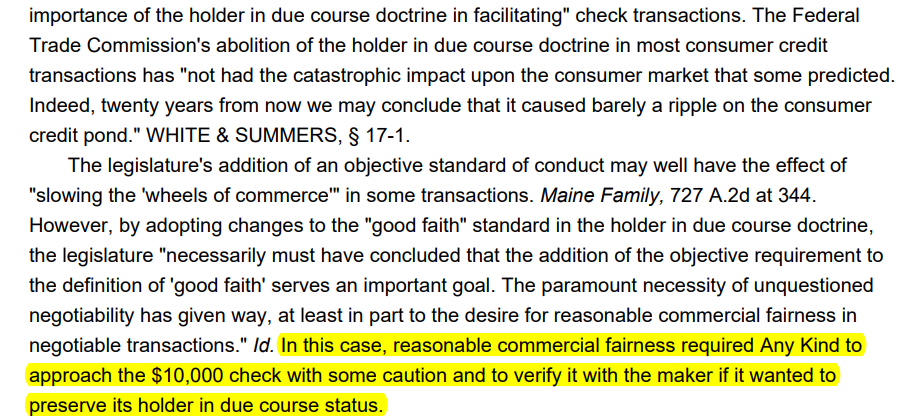
The issue in this case is whether a check cashing store qualifies as a holder in due course so that it can collect on a $10,000 check written by an elderly man Page 162 who was fraudulently induced to issue the check by the person who cashed it. We hold that the check cashing store was not a holder in due course, because the procedures it followed with the $10,000 check did not comport with reasonable commercial standards of fair dealing. The case is the story of John G. Talcott, Jr., a ninety-three-year-old Massachusetts resident, D.J. Rivera, a "financial advisor" to Talcott, and Salvatore Guarino, a cohort of Rivera. In the mid-1990's, Rivera sold Talcott an investment for "somewhere in the amount of $75,000." The investment produced no returns. On December 7, 1999, Guarino established check cashing privileges at Any Kind Checks Cashed, Inc. ("Any Kind") by filling out a customer card. The card included his social security number and identification by driver's license. On the card, Guarino listed himself as a broker. That day, he cashed a $450 check without incident. On January 10, 2000, Rivera telephoned Talcott and talked him into sending him a check for $10,000 made out to Guarino, which was to be used for travel expenses to obtain a return on the original $75,000 investment. Talcott understood that Guarino was Rivera's partner. Rivera received the check on January 11. Talcott spoke to Rivera on the morning of January 11. Rivera indicated that $10,000 was more than what was needed for travel. He said that $5,700 would meet the travel costs. Talcott called his bank and stopped payment on the $10,000 check. In spite of what Rivera told Talcott, Guarino appeared at Any Kind's Stuart, Florida office on January 11 and presented the $10,000 check to Nancy Michael. She was a supervisor with the company with the authority to approve checks over $2,000. Guarino showed Michael his driver's license and the Federal Express envelope from Talcott in which he received the check. She asked him the purpose of the check. Consistent with the information on the customer card, he told her that he was a broker and that the maker of the check had sent it as an investment. She was unable to contact the maker of the check by telephone. Based on her experience, Michael believed the check was good; the Federal Express envelope was "very crucial" to her decision, because it indicated that the maker of the check had sent it to the payee trying to cash the check. After deducting the 5% check cashing fee, Michael cashed the check and gave Guarino $9,500. The next day she deposited the check in the company's bank. On January 15,2000 , Rivera called Talcott and asked about the $5,700, again promising to send him a return on his investment. The same day, Talcott sent a check for $5,700. He assumed that Rivera knew that he had stopped payment on the $10,000 check. On January 17,2000 , Guarino went into the Stuart Any Kind store and presented the $5,700 check to the teller, Joanne Kochakian. He showed her the Federal Express envelope in which the check had come. Company policy required a supervisor to approve a check over $2,000. Kochakian noticed that Michael had previously approved the $10,000 check. She called Michael, who was working at another location, and told her about Guarino's check. Any Kind had no written procedures that a supervisor was required to follow in deciding which checks over $2,000 to cash. Michael had the discretionary "decision-making power as a supervisor to decide whether or not the check [was] any good." She relied on "instinct and judgment" in deciding what inquiry to make before cash- Page 163 -ing a check. In the brief non-jury trial, there was no evidence concerning the general practice of the check cashing industry. Michael instructed the cashier not to cash the check until she contacted the maker, Talcott, to obtain approval. On her first attempt, Kochakian received no answer, using the number on the back of Guarino's check cashing card. When she told Guarino that she would not cash his check, he gave her another number to call, which was the same as the first number except that two numbers were reversed. On the second call, [1] a woman answered the phone. Kochakian identified herself and asked for Talcott. Talcott approved cashing the $5,700 check. There was no discussion of the $10,000 check. Any Kind cashed the second check for Guarino, from which it deducted a 3% fee. On January 19, Rivera called Talcott to warn him that Guarino was a cheat and a thief. Talcott immediately called his bank and stopped payment on the $5,700 check. Talcott's daughter called Any Kind and told it of the stop payment on the $5,700 check. There was no dispute at trial that Guarino and Rivera had pulled a scam on Talcott to get him to issue the checks. Any Kind filed a two-count complaint against Guarino [2] and Talcott, claiming that it was a holder in due course. Talcott's defense was that Any Kind was not a holder in due course and that his obligation on the checks was nullified because of Guarino's illegal acts. The trial court entered final judgment in favor of Any Kind for only the $5,700 check. [3] On the $10,000 check, the judge found for Talcott. The court found that the circumstances surrounding the cashing of the $10,000 check were sufficient to put [Any Kind] on notice of potential defenses and/or infirmities. The best evidence of this is that the plaintiff attempted to contact the maker but was unable to do so on the first check, and did so on the second. The circumstances of a person describing himself as a broker, receiving funds in the amount of $10,000 and negotiating the check for those funds at a $500 discount are sufficient to put [Any Kind] on inquiry notice that some confirmation or explanation should be obtained. Using the terminology of the Uniform Commercial Code, Talcott was the maker or "drawer" of the check, the person who signed the draft "as a person ordering payment." 673.1031(1) (c), Fla. Stat. (2001). [4] By Federal Expressing the check to Guarino, Talcott issued the check to him. See 673.1051(1) (defining "issue" as "the first delivery of an instrument by the maker or drawer ... for the purpose of giving rights on the instrument to any person"). Guarino indorsed the check and cashed it with Any Kind. See 673.2041(1) (defining "indorsement"). Any Kind immediately made the funds available to Guarino, less its fee. Talcott stopped payment on the check with his bank, so the check was returned to Any Kind. See 674.403(1) (regarding a customer's right to stop payment). Page 164 When Guarino negotiated the check with Any Kind, it became a holder of the check, making it a "person entitled to enforce" the instrument. See 673.2011(1),.2031(2),.3011(1). As the drawer of the check dishonored by his bank, Talcott's obligation was to pay the draft to a person entitled to enforce the draft "[a]ccording to its terms at the time it was issued. ..." 673.4141(2)(a); see 19B Fla. Stat. Ann. 345 cmt. 7 (1993). Unless Any Kind is a holder in due course, its right to enforce Talcott's obligation to pay the draft is subject to (1) all defenses Talcott could raise "if the person entitled to enforce the instrument were enforcing a right to payment under a simple contract," and (2) a claim of "recoupment" Talcott could raise against Guarino. 673.3051(1) \& (2), Fla. Stat. (2001). Because Talcott was fraudulently induced to issue the checks, this case turns on Any Kind's entitlement to holder in due course status. A "holder in due course" is a holder who takes an instrument without "apparent evidence of forgery or alteration" for value, in good faith, and without notice of certain claims and defenses. See 673.3021 (1), Fla. Stat. (2001). As the party claiming that it was a holder in due course, Any Kind had the burden to prove that status by a preponderance of the evidence. See 673.3081(2), Fla. Stat. (2001); Seinfeld v. Commercial Bank \& Trust Co., 405 So.2d 1039, 1041 (Fla. 3d DCA 1981). The question for this court is whether the trial court erred in finding that Any Kind was not a holder in due course of the $10,000 check based on the findings of fact made at trial, keeping in mind that Any Kind bore the burden of proof. That question turns on whether Any Kind acted "[i]n good faith" within the meaning of section 673.3021(1)(b)2. The good faith requirement of the holder in due course doctrine "has been the source of an ancient and continuing dispute." WHITE \& SUMMERS, UNIFORM COMMERCIAL CODE 17-6 (4th ed. 1995). On the one hand, [s]hould the courts apply a so-called objective test, and ask whether a reasonably prudent person, behaving the way the alleged holder in due course behaved, would have been acting in good faith? Or should the courts instead apply a subjective test and examine the person's actual behavior, however stupid and irrespective of the reaction a reasonably prudent person would have had in the same circumstance? The legal establishment has steered a crooked course through this debate. Id.; see Patricia L. Heatherman, Comment, Good Faith in Revised Article 3 of the Uniform Commercial Code: Any Change? Should There Be?, 29 WILLAMETTE L. REV. 567 (1993). Prior to 1992, section 671.201(19), Florida Statutes (1991), defined "good faith" as "honesty in fact in the conduct of the transaction concerned." Florida courts interpreted this definition as creating a subjective test. See Cash-A-Check of S. Fla., Inc. v. Sunshine Elec. Contractors, Inc., 26 Fla. Supp. 2d 17, 19 (Fla. Palm Beach County Ct. 1987). For example, we wrote inBarnett Bank of Palm Beach County v. Regency Highland Condo. Ass'n, 452 So.2d 587, 590 (Fla. 4th DCA 1984), that "good faith" under the holder in due course doctrine did "not include due care; rather lack of good faith must be the result of actual, not constructive, knowledge of the wrongdoing tantamount to dishonesty or bad faith." In another case, Judge Schwartz wrote that the "Florida version of the holder in due course provision of the U.C.C. does seem to protect the objective- \#12; -ly stupid so long as he is subjectively pure of heart." Seinfeld, 405 So.2d at 1042. Application of Barnett Bank's "honesty in fact" standard to Any Kind's conduct in this case would clothe it with holder in due course status. It is undisputed that Any Kind's employees were pure of heart, that they acted without knowledge of Guarino's wrongdoing. However, in 1992, the legislature adopted a new definition of "good faith" that applies to the section 673.3021 definition of a holder in due course: "'[g]ood faith' means honesty in fact and the observance of reasonable commercial standards of fair dealing." Ch. 92-82, 2, at 759, Laws of Fla. (codified at 673.1031(1)(d) ). To the old, subjective good faith, "honesty in fact" standard, the legislature added an objective component - the "pure heart of the holder must now be accompanied by reasoning that assures conduct comporting with reasonable commercial standards of fair dealing." Maine Family Fed. Credit Union v. Sun Life Assurance Co. of Canada, 727 A.2d 335, 342 (Me. 1999). No longer may a holder of an instrument act with "a pure heart and an empty head and still obtain holder in due course status." Id. Comment 4 to section 673.1031 , Florida Statutes Annotated, attempts to shed light on how to interpret the new standard: Although fair dealing is a broad term that must be defined in context, it is clear that it is concerned with the fairness of conduct rather than the care with which an act is performed. Failure to exercise ordinary care in conducting a transaction is an entirely different concept than failure to deal fairly in conducting the transaction. The Code does not define the term "fair dealing." As the Maine Supreme Court has observed, the "most obvious question arising from the use of the term fair is: fairness to whom?" Maine Family, 727 A.2d at 343. Application of holder in due course status is the law's value judgment that certain holders are worthy of protection from certain types of claims. For example, it has been argued that application of the old subjective standard facilitated the transfer of checks in the stream of commerce; arguably one would be "more willing to accept the checks if ... she knows ... she can be a holder in due course of that instrument and take it free of defenses that might have existed between the buyer and the seller in the underlying transaction." WHITE \& SUMMERS, 17-1. In applying the new standard, "fairness" should be measured by taking a global view of the underlying transaction and all of its participants. A holder "must act in a way that is fair according to commercial standards that are themselves reasonable." Maine Family, 727 A.2d at 343. To apply the law requiring "good faith" under section 673.3021(1), we adopt the analysis set forth by the Supreme Court of Maine: The factfinder must ... determine, first, whether the conduct of the holder comported with industry or "commercial" standards applicable to the transaction and, second, whether those standards were reasonable standards intended to result in fair dealing. Each of those determinations must be made in the context of the specific transaction at hand. If the factfinder's conclusion on each point is "yes," the holder will be determined to have acted in good faith even if, in the individual transaction at issue, the result appears unreasonable. Thus a holder may be accorded holder in due course status where it acts pursuant to those reasonable commercial standards of fair dealing - even if it is negligent - Page 166 but may lose that status, even where it complies with commercial standards, if those standards are not reasonably related to achieving fair dealing. Id. There was no evidence at trial concerning the check cashing industry's commercial standards. Even assuming that Any Kind's procedures for checks over $2,000 met the industry's gold standard, we hold that in this case the procedures followed were not reasonably related to achieve fair dealing with respect to the $10,000 check, taking into consideration all of the participants in the transaction, Talcott, Guarino, and Any Kind. Check cashing businesses are regulated by Chapter 560, Florida Statutes (2001), the Money Transmitters' [5] Code. See 560.101, Fla. Stat. (2001). Among the purposes of Chapter 560 are to provide for and promote: (b) The maintenance of public confidence in the money transmitter industry. (c) The protection of the interests of the public in the money transmitter system. (e) The opportunity for money transmitters to be and remain competitive with each other and with other business organizations ... (f) The opportunity for money transmitters to effectively serve the convenience and needs of their customers and the public ... (g) The opportunity for the management of money transmitter businesses to exercise its business judgment within the framework of the code. 560.102(2). Nothing in Chapter 560 purports to alter or amend any of the provisions of Chapter 673 , leading to a conclusion that the legislature did not intend to bend the holder in due course provision of the Uniform Commercial Code - Negotiable Instruments to specially accommodate check cashing businesses. Check cashing businesses occupy a special niche in the financial industry. They are part of the "alternative financial services" [6] or "fringe banking" [7] sector, a part of the market that "has become a major source of traditional banking services for low-income and working poor consumers, residents of minority neighborhoods, and people with blemished credit histories." Lynr Drysdale \& Kathleen E. Keest, The Two-Tiered Consumer Financial Services Marketplace: The Fringe Banking System and its Challenge to Current Thinking About the Role of Usury Laws in Today's Society, 51 S.C. L. Rev. 589, 591 (2000). Check cashing involves "charging a service fee for providing instant cash to unbanked customers." Joseph R. Falasco, Who's Getting Used in Arkansas: An Analysis of Usury, Check Cashing, and the Arkansas Check-Cashers Act," 55 ARK. L. REV. 149, 156 (2002); see Drysdale \& Keest, at 626. Check cashing customers "generally have limited resources available to access immediate cash." Falasco, at 155. Check cashing stores are often in locations where traditional banks fear to tread. Drysdale and Keest report the research that demonstrates that check cashing out- -lets are usually located in lower income neighborhoods: For example, the Federal Reserve Bank of Boston looked at multi-census tract areas in cities in New England where check cashers were most densely clustered - - Boston, Hartford, and Providence. The Boston study found that the cities with high [check cashing outlet] clusters tended "to have high percentages of low- and moderate-income census tracts and households," high percentages of households below the poverty level, and higher shares of households on fixed incomes (either public assistance or social security). More dramatic is the Woodstock Institute's study of the relative distribution of banks and [check cashing outlets and currency exchanges] in Chicago, which examines specific census tracts. This study found that the currency exchanges are predominately located in lower income, minority communities. The currency exchange to bank ratio in five predominately minority communities with median household incomes below $22,000 exceeded ten to one. The lowest income communities, with median incomes of $7908 and $12,570, each had twelve check cashers for every one or two banks. [8] Drysdale \& Keest, at 629 (footnotes omitted). In such areas, the typical check presented for cashing is not a large one - a paycheck, child support, social security, or public assistance check. Section 560.309(4)(b) contemplates that such checks will be presented at check cashing outlets; it limits the fee charged for the payment of "any kind of state public assistance or federal social security benefits payable to the bearer." Attractions of check cashing outlets are convenience and speed. As the amicus points out, many check cashing businesses are open twenty-four hours a day, seven days a week. Unlike banks, check cashing stores cannot place a hold on a check before releasing funds. The Florida Administrative Code requires payment to be made "immediately in currency for every payment instrument received by a person engaging in the activities of a check casher." Fla. Admin. Code R. 3C-560.804(1). The statute and administrative rules also contemplate that a check cashing business will engage in various types of "verification" of a check. 560.309. Rule 3C- 560.801 of the Florida Administrative Code permits a check casher to collect the "direct costs associated with verifying a payment instrument holder's identity, residence, employment, credit history, account status, or other necessary information. " (Italics supplied). "Other necessary information" could include long distance or telephone charges incurred to contact the drawer of a check. Against this backdrop, we cannot say that the trial court erred in finding that the $10,000 check was a red flag. The $10,000 personal check was not the typical check cashed at a check cashing outlet. The size of the check, in the context of the check cashing business, was a proper factor to consider under the objective standard of good faith in deciding whether Any Kind was a holder in due course. See Maine Family, 727 A.2d at 344. Guarino was not the typical customer of a check cashing outlet. As the trial judge observed, because of the 5% fee charged, it is unusual for a small businessman such as a broker to conduct business through a check cashing store instead of through a traditional bank. Guarino did not have a history with Any Kind of cashing checks of similar size without incident. The need for speed in a business transaction is usually less acute than for someone cashing a paycheck or welfare check to pay for life's necessities. The need for speed in cashing a large business check is consistent with a drawer who, for whatever reason, might stop payment. Fair dealing in this case required that the $10,000 check be approached with a degree of caution.\#12; 12 ; If a drawer has a right to stop payment of a check, and a traditional bank usually places a hold on uncollected funds after a payee deposits a check into an account, then the legal dispute after a stop payment will usually be between the drawer of the check and the payee, the two parties that had the dealings leading to the payment. Thus, where a check is cashed at a bank or savings and loan, the law will often place the loss on the wrongdoer in the underlying transaction. This is a desirable goal. Where a check cashing store releases funds immediately, the holder in due course doctrine steps in, frequently putting the loss on a wronged maker, in furtherance of the policy that facilitating the transfer of checks benefits the economy. In this case, the policy reasons behind easy negotiability do not outweigh the reasons for caution. Very loose application of the objective component of "good faith" would make check cashing outlets the easy refuge of scam artists who want to take the money and run. The concept of "fair dealing" includes not being an easy, safe harbor for the dishonest. To affirm the trial court is not to wreak havoc with the check cashing industry. Verification with the maker of a check will not be necessary to preserve holder in due course status in the vast majority of cases arising from check cashing outlets. This was neither the typical customer, nor the typical transaction of a check cashing outlet. We disagree with the amicus, who worries that requirement of verification by the maker in this case "would inhibit the long standing policy of the free negotiation of instruments." Again, this is not the usual case. Also, as White and Summers have written, "there has been debate about the importance of the holder in due course doctrine in facilitating" check transactions. The Federal Trade Commission's abolition of the holder in due course doctrine in most consumer credit transactions has "not had the catastrophic impact upon the consumer market that some predicted. Indeed, twenty years from now we may conclude that it caused barely a ripple on the consumer credit pond." WHITE \& SUMMERS, 17-1. The legislature's addition of an objective standard of conduct may well have the effect of "slowing the 'wheels of commerce'" in some transactions. Maine Family, 727 A.2d at 344. However, by adopting changes to the "good faith" standard in the holder in due course doctrine, the legislature "necessarily must have concluded that the addition of the objective requirement to the definition of 'good faith' serves an important goal. The paramount necessity of unquestioned negotiability has given way, at least in part to the desire for reasonable commercial fairness in negotiable transactions." Id. In this case, reasonable commercial fairness required Any Kind to approach the $10,000 check with some caution and to verify it with the maker if it wanted to preserve its holder in due course status
Step by Step Solution
There are 3 Steps involved in it
Step: 1

Get Instant Access to Expert-Tailored Solutions
See step-by-step solutions with expert insights and AI powered tools for academic success
Step: 2

Step: 3

Ace Your Homework with AI
Get the answers you need in no time with our AI-driven, step-by-step assistance
Get Started


